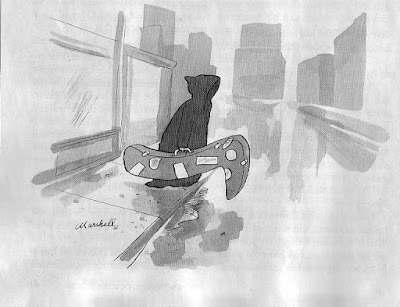This is a meaningful essay in the NY Times by Susan Gubar, a woman living with metastatic ovarian cancer. She speaks from her heart, from "being there."
It begins with this memorable sentence: "We know little about death, after all: There are no survivors to tell the tale. But we do know something about dying."
This is a repository for material dealing with the experiences of dying people, grieving relatives and the care givers that attend them. It is a supplement to a Williams College course on Death and Dying that was held during January 2015.
Thursday, October 29, 2015
Monday, October 26, 2015
Why Are Doctors Afraid of The Word “Death”?
If death is seen as the last enemy of medicine, then doctors will lose
every time. The human mortality rate continues to hold steady at 100
percent and shows no signs of changing. Our next medical innovation —
the acceptance of our mortality — will not come as a technical solution to a scientific problem. It will have to be a more human approach to a deep mystery of every life — the mystery of being mortal.
This is an excerpt from a fine article in The Washington Post: Why Are Doctors Afraid of The Word "Death" that was sent to us by Karen Gunderscheimer of Williamstown, Massachusetts.
This is an excerpt from a fine article in The Washington Post: Why Are Doctors Afraid of The Word "Death" that was sent to us by Karen Gunderscheimer of Williamstown, Massachusetts.
Monday, October 19, 2015
The Lonely Death of George Bell
 |
| Apartment of George Bell after his unattended death in 2014 |
They found him in the living room, crumpled up on the mottled carpet. The police did. Sniffing a fetid odor, a neighbor had called 911. The apartment was in north-central Queens, in an unassertive building on 79th Street in Jackson Heights.
George Bell, a life-long bachelor, died unattended at age 72 in Queens, New York. If you make it through this article you will learn much and have much to ponder.
Deborah Alecson writes: This is a remarkable piece of investigative reporting that starts with the smell of death from within an apartmant to the life of a man, George Bell, who died ultimately alone amongst accumulated clutter and filth. We also learn about the "players" involved in this kind of death from the people who rummage through his belongings for important documents and for clues of people in his circle, to the handling of his body and its final cremation. This is a deeply human story placed in the heart of what a "death system" is in our urban culture.
The Letters on this article are also worth reading.
Wednesday, September 30, 2015
Saturday, September 26, 2015
When it comes to end-of-life care, perhaps we do need a bigger hammer
by Richard Sontheimer.
While sitting one
evening with my terminally ill elderly mother, she again asked me to help her
end her suffering. This time it was,
“Could you just go get the hammer and hit me in the head?” Her previous
requests had included “Son, you are a doctor, can’t you do something to help me
with this?” And then, “They treat
animals better than this.”
On previous occasions,
I had to remind my mom that we lived in one of the 48 states in the USA that
does not have a death-with-dignity euthanasia law. Her response was, “Then can you move me to
Oregon or Washington?”
Rick Sontheimer is an old friend of mine. His article is well-written, deep and important. You can access it at Kevinmd.com.
Thursday, September 24, 2015
Escape From the Land of the Pink Bibs
This is the story of Narcy Houle’s father, a highly respected orthopedic
surgeon, developed Alzheimer’s. During
the course of the disease, he broke his hip. One day when we visited him at the
nursing center, about six months after his accident, we found him sitting in a
row of patients all wearing pink bibs, left on after they had finished eating.
Like the others, his head was bent toward his lap; though his eyes were open, they
were not focused on anything. His shoulders slouched, like a rag doll’s, and his
mouth hung slightly ajar.
What he needed was a geriatrician.
Most health care professionals have had little to no training in the care
of older adults. Currently, 97 percent of all medical students in the United
States do not take a single course in geriatrics.
Recent studies show that good geriatric care can make an enormous
difference. Older adults whose health is monitored by a geriatrician enjoy more years
of independent living, greater social and physical functioning and lower
presence of disease. In addition, these patients show increased satisfaction, spend
less time in the hospital, exhibit markedly decreased rates of depression and spend less
time in nursing homes.
See:
An Aging Population, Without the Doctors to Match by Marcy Cottrell Houle (NY Times, September 23, 2015)
Saturday, August 29, 2015
A Racial Gap in Attitudes Toward Hospice Care
Dateline Buffalo: Twice already, Narseary and Vernal Harris have watched a son die. The first
time — Paul, at 26 — was agonizing and frenzied, his body tethered to a machine
meant to keep him alive as his sickle cell anemia progressed. When the same illness ravaged Solomon, at 33, the
Harrises reluctantly turned to hospice in the
hope that his last days might somehow be less harrowing than his brother’s.
This is a fine article about hospice use in the black community. about why it is less frequently sought, and why blacks distrust the health care system.
Subscribe to:
Posts (Atom)




